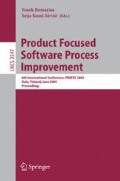Abstract
Mobile application development is a challenging task for the software companies due to complicated technological and business environments. Patterns have been recognised to be a valuable tool in software development, for they allow design experiences and solutions to be documented systematically and facilitate the communication of design issues. Patterns can be seen as a part of organisational memory, a means to preserve the design knowledge and enable its reuse in later products and projects. In this paper we study how the design patterns can support organisational memory in mobile application design. We present the utilisation of patterns as a dynamic process and analyse their relationship and suitability to the process of organisational memory. As a result, we present a framework, which can be used for supporting and evaluation of patterns as a means for storing organisational memory in software companies.
Access this chapter
Tax calculation will be finalised at checkout
Purchases are for personal use only
Preview
Unable to display preview. Download preview PDF.
References
Nonaka, I.: A Dynamic Theory of Organizational Knowledge Creation. Organization science 5 (1994)
Terveen, L.G., Selfridge, P.G., Long, M.D.: From Folklore to Living Design Memory. In: SIGCHI conference on Human factors in computing systems. ACM Press, Amsterdam (1993)
Stein, E.W.: Organizational Memory: Review of Concepts and Recommendations for Management. International Journal of Information Management 15, 17–32 (1995)
Buschmann, F., Meunier, R., Rohnert, H., Sommerlad, P., Stal, M.: Pattern-oriented software architecture - A system of patterns. John Wiley & Sons Ltd., Chicester (1996)
Gamma, E., Helm, R., Johnson, R., Vlissides, J.: Design Patterns: Elements of reusable object oriented software. Addison-Wesley, Boston (1995)
Galbraith, J.R.: Competing with Flexible Lateral Organisations. Addison-Wesley, USA (1994)
Chen, G.: Wireless Location based Services, Technologies. Applications and Management (2002)
Kar, E.v.d., Maitland, C.F., Montalvo, U.W.d., Bouwman, H.: Design guidelines for mobile information and entertainment services: based on the Radio538 ringtunes i-mode service case study. In: 5th international conference on Electronic commerce, Pittsburgh, Pennsylvania, USA (2003)
Ketola, P.: Integrating Usability with Concurrent Engineering in Mobile Phone Development, Department of Computer and Information Sciences, University of Tampere, Tampere (2002)
Rupnik, R., Krisper, M.: The Role of Mobile Applications in Information Systems. In: The Second International Conference on Mobile Business, Austrian Computer Society, Vienna, Austria (2003)
Siau, K., Shen, Z.: Mobile communications and mobile services. International Journal of Mobile Communications 1, 3–14 (2003)
Nokia, Mobile Internet Technical Architecture - Visions and Implementations. Edita Publishing Inc. IT Press (2002)
Argyris, C., Schön, D.: Organizational Learning: A Theory of Action Perspective. Addison-Wesley, Reading (1978)
Walsh, J.P., Ungson, G.R.: Organizational memory. Academy of management review 16 (1991)
Bass, L., Clements, P., Kazman, R.: Software Architecture in Practice. Addison-Wesley, United States (1999)
Gross, D., Yu, E.: From Non-Functional Requirements to Design through Patterns. Requirements Engineering 6 (2001)
Alexander, C., Ishikawa, S., Silverstein, M., Jakobson, M., Fiksdahl-King, I., Angel, S.: A Pattern Language, vol. 2. Oxford University press, New York (1977)
Fowler, M.: Patterns of enterprise application architecture. Addison-Wesley, Boston (2003)
Roth, J.: Patterns of mobile interaction. Personal and Ubiquitous Computing 6 (2002)
Noble, J., Weir, C.: Small Memory Software: Patterns for Systems with Limited Memory. Addison-Wesley Professional, Reading (2000)
Granlund, Å., Lafrenière, D., Carr, D.A.: A Pattern supported approach to the user interface design process. In: 9th International Conference on Human Computer Interaction, New Orleans (2001)
Coplien, J.: Software Patterns. SIGS Books & Multimedia, New York (2000)
Tasker, M.: Professional Symbian programming: Mobile solutions on the EPOC platform. Wrox Press, Inc. (2000)
Hui, B.: Big designs for small devices (2002), http://www.javaworld.com/javaworld/jw-12-2002/jw-1213-j2medesign.html
Yuan, M.: Developing Web-service-driven, smart mobile applications. O’Reilly Media, Inc. (2004), Available from www.ondotnet.com/pub/a/dotnet/2004/02/23/mobilewebserviceapps.html
Guidi-Polanco, F., Cubillos, F.C., Menga, G., Penha, S.: Patterns for point-to-point communications, Dip. Automatica e Inormatica, Politecnico di Torino, Italy, VikingPLoP 2003 (2003), http://plop.dk/vikingplop/2003/Patterns/guidi.pdf
Allin, J., Dixon, J., Forrest, J., Heath, M., Richardson, T., Shackman, M.: Professional Symbian Programming. Mobile Solutions on the EPOC platform., Wrox Press Ltd., USA (2000)
Agerbo, E., Cornils, A.: How to preserve the benefits of Design Patterns. In: 13th ACM SIGPLAN conference on Object-oriented programming, systems, languages, and applications, Portland, Oregon, USA (1998)
Lewitt, B., March, J.G.: Organizational learning. Annual Review of Sociology 3 (1988)
Akgün, A.E., Lynn, G.S., Reilly, R.: Multi-dimensionality of learning in new product development teams. European Journal of Innovation Management 5 (2002)
Manns, M. L.: An investigation into factors affecting the adoption and diffusion of software patterns in industry, De Montfort University, United Kingdom, Leicester (2002)
Galbraith, J.R.: Designing the innovating organization. In: Starkey, K. (ed.) How organizations learn, pp. 156–181. International Thomson Business Press, London (1996)
Alexander, C.: The Timeless Way of Building. Oxford University Press, New York (1979)
Author information
Authors and Affiliations
Editor information
Editors and Affiliations
Rights and permissions
Copyright information
© 2005 Springer-Verlag Berlin Heidelberg
About this paper
Cite this paper
Ahlgren, R., Markkula, J. (2005). Design Patterns and Organisational Memory in Mobile Application Development. In: Bomarius, F., Komi-Sirviö, S. (eds) Product Focused Software Process Improvement. PROFES 2005. Lecture Notes in Computer Science, vol 3547. Springer, Berlin, Heidelberg. https://doi.org/10.1007/11497455_13
Download citation
DOI: https://doi.org/10.1007/11497455_13
Publisher Name: Springer, Berlin, Heidelberg
Print ISBN: 978-3-540-26200-8
Online ISBN: 978-3-540-31640-4
eBook Packages: Computer ScienceComputer Science (R0)

